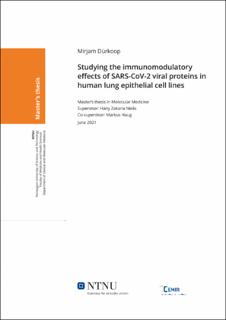| dc.description.abstract | The novel coronavirus disease 2019 (COVID-19), caused by the severe acute respiratory syndrome coronavirus 2 (SARS-CoV-2), presents a wide spectrum of clinical manifestations which range from asymptomatic or cold-like symptoms to severe pneumonia and multisystem failure with fatal outcome. Disease severity correlates with dysregulated host immune responses, characterized by delayed or missing antiviral type I and III interferon (IFN) responses and excessive inflammatory responses. Several viral proteins are proposed to inhibit IFN production, among these SARS-CoV-2 Orf3a, Orf6 and Orf9b. However, most studies have so far focused on viral protein inhibition of type I IFN (IFNα/β) responses in cell types that are of low relevance, and most mechanisms are not yet fully characterized. Here, we studied immunomodulatory effects of SARS-CoV-2 Orf3a, Orf6 and Orf9b proteins in human lung epithelial cell lines (A549, Calu-3) as a relevant cell model for SARS-CoV-2 infection and focused on effects on type III IFN (IFN-λ1/2/3) induction. For this, we used lentiviral transduction to generate cell lines stably expressing the viral proteins upon doxycycline treatment. We demonstrate that A549 and Calu-3 cells respond to transfection of poly(I:C), a dsRNA mimic and common RIG-I/MDA5 agonist, by inducing antiviral and inflammatory immune responses. Inflammatory cytokine and chemokine production was not found altered in lung epithelial cells expressing viral proteins. But interestingly we found a slight reduction in IFN-λ2 secretion from A549 cells expressing Orf3a, Orf6 or Orf9b compared to wildtype cells. Combined, our findings suggest exclusive anti-IFN activity by SARS-CoV-2 Orf3a, Orf6 and Orf9b, but lower type III IFN antagonistic effects compared to what has previously been proposed for type I IFNs. This highlights the distinct role of type III IFNs in maintaining antiviral immunity at the airway epithelium, and the importance of further in-depth studies. Deeper understanding of the immune responses in severe COVID-19 is strongly needed to develop effective therapeutic approaches and to prepare us with knowledge for future pandemic coronavirus outbreaks. | |
